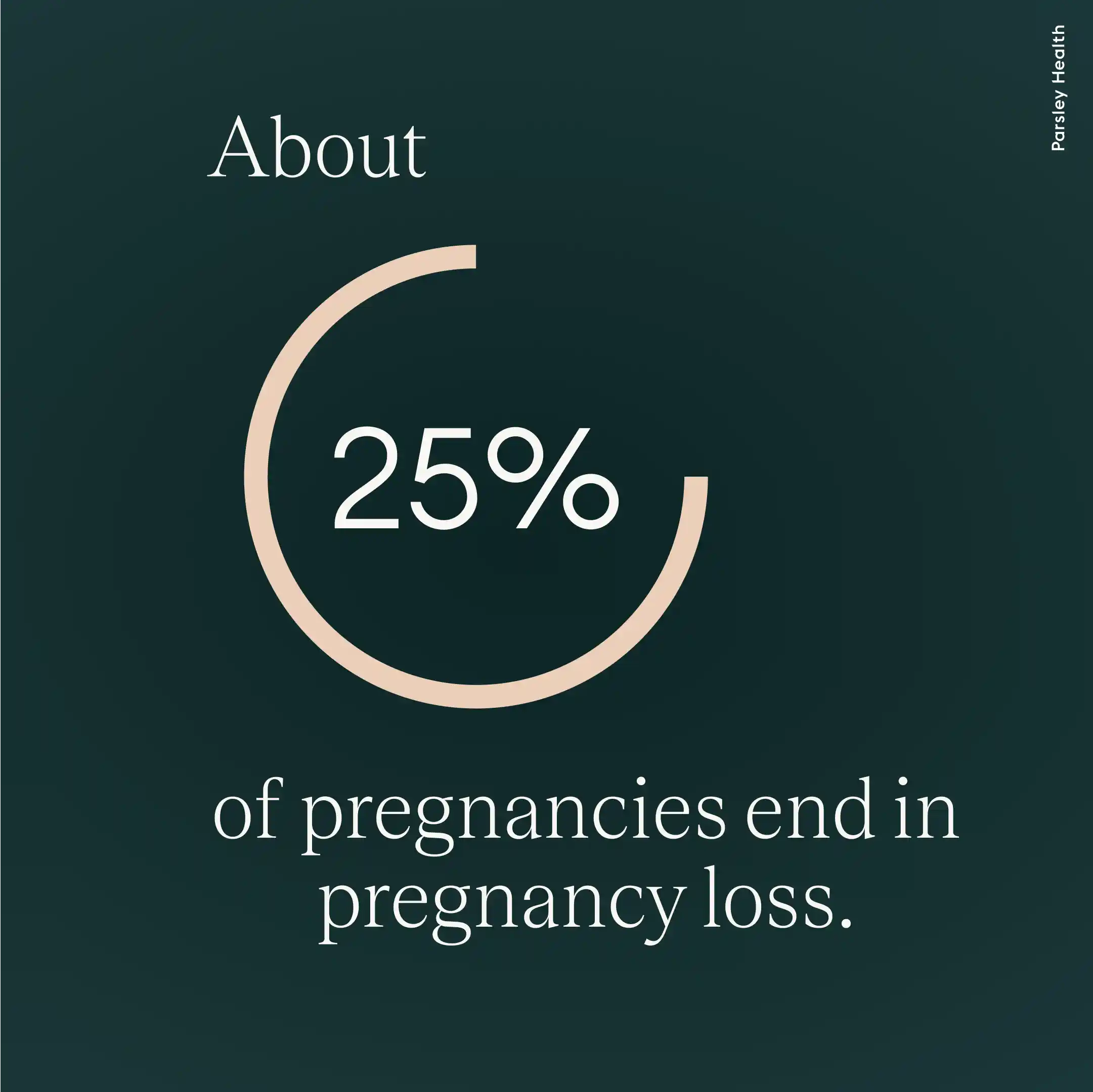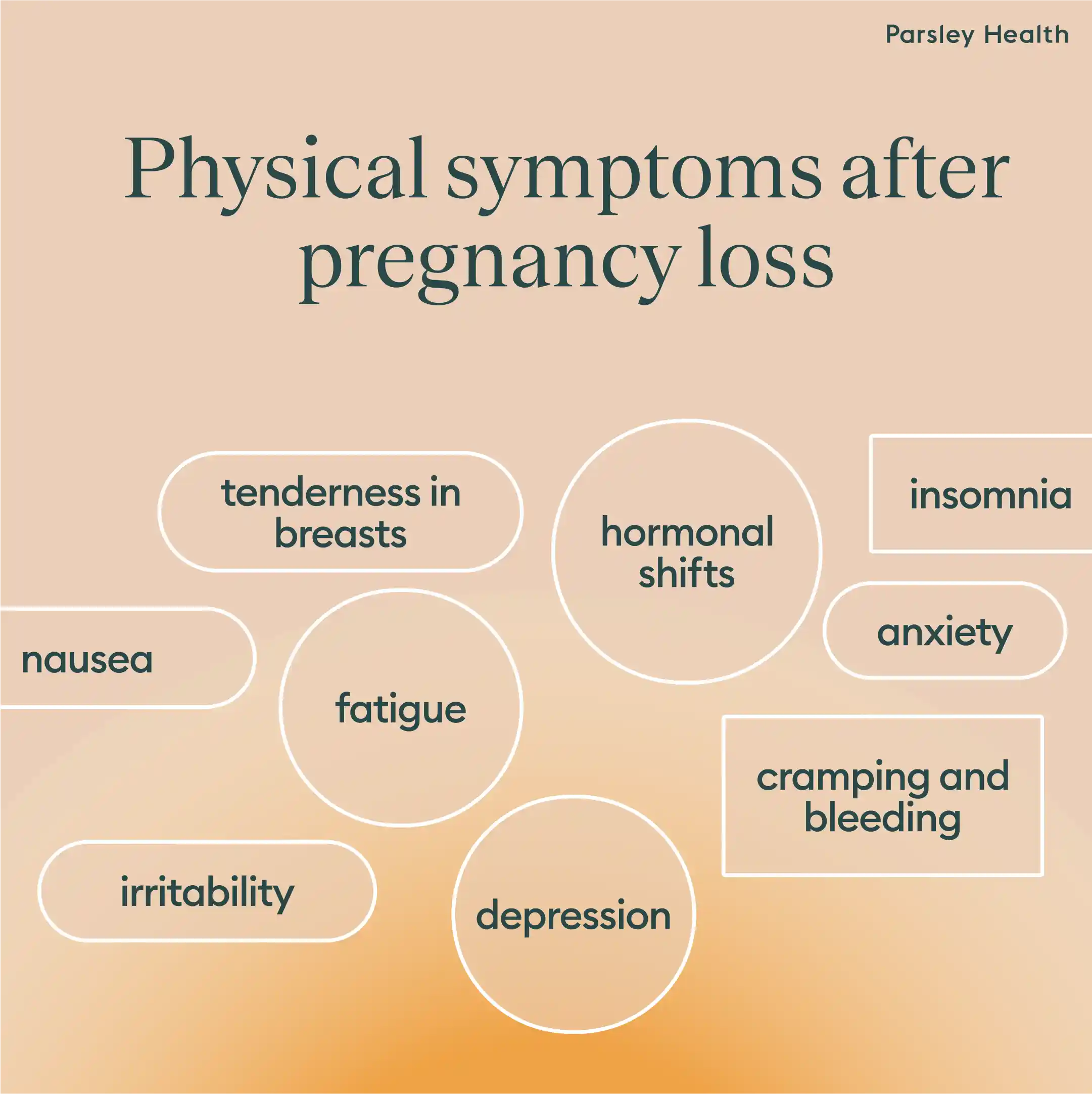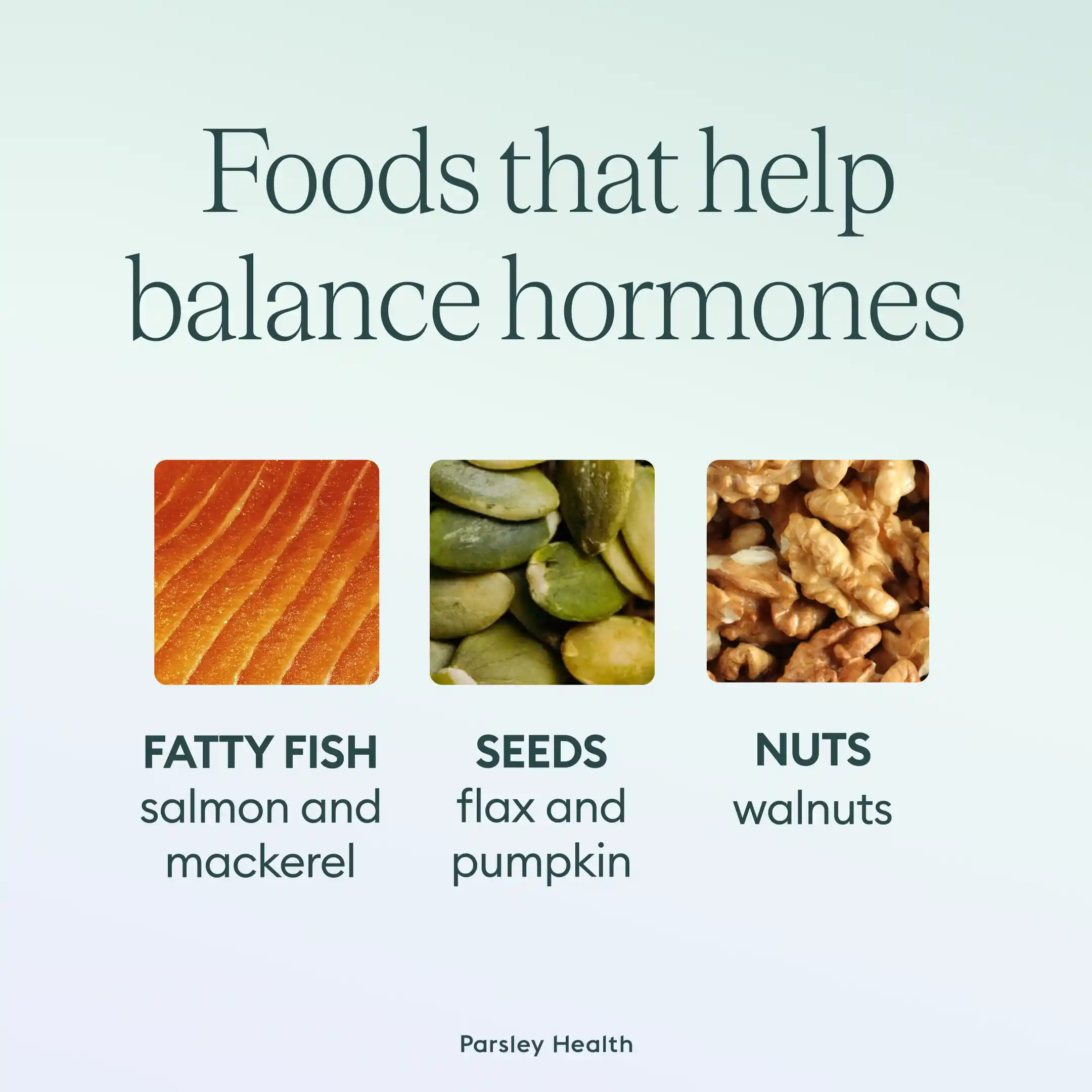This article contains additional reporting by Jennifer Chesak.
Your body has been through trauma after pregnancy loss and will need time and additional care to heal. Your body will also need time to rebalance hormones after a miscarriage.
If you’ve recently experienced a miscarriage, know that you’re not alone. About 25 percent of pregnancies end in pregnancy loss.
As miscarriage is discussed more openly in society, the conversation often centers around the emotional and mental health implications. But the physiological response your body undergoes after pregnancy loss is just as important to talk about.

Your hormones were preparing for one event, and then your body pivoted in a different direction. Here’s what you need to know about caring for your body during this difficult stage and rebalancing your hormones after a miscarriage.
What can cause a miscarriage?
Most miscarriages result from external factors that are out of your control. The most common cause of miscarriage is chromosomal abnormalities, according to the American Academy of Family Physicians.
Foodborne pathogens, like salmonella, are also a cause of pregnancy loss, which is why pregnant people are often instructed not to eat uncooked or undercooked eggs, meat, or fish.
Other potential causes of miscarriage involve mitochondrial dysfunction. Mitochondria are responsible for producing energy inside our cells, including those that will develop into a fetus.
Mitochondrial dysfunction can affect the genetic makeup of the embryo or fetus, explains Jaclyn Tolentino, DO, a physician formerly at Parsley Health in Los Angeles.
You could be especially prone to mitochondrial dysfunction if you have an autoimmune disorder or other immune health issues.
What happens to your body after a miscarriage?
Every person’s body reacts differently to pregnancy loss. “The differentiating factors include how far along the pregnancy was and what treatments were used to manage the miscarriage,” Dr. Tolentino says.

Here are the most common signs and symptoms after pregnancy loss.
Cramping and bleeding
You may experience some uncomfortable cramping and bleeding after a miscarriage while the uterus contracts to expel blood and tissue.
Don’t be alarmed if the bleeding is heavier than that of your usual menstrual cycle, Dr. Tolentino says. “The severity and duration of the bleeding can vary among individuals."
Cramping and bleeding may last for one to four weeks. Stay in contact with your provider during this time to discuss any ongoing symptoms, especially if bleeding doesn’t seem to be slowing down.
Hormonal changes
The hormonal changes that occur after a miscarriage really depend on how far along you were in the pregnancy.
The following are some of the major hormones at play, how they change during pregnancy, and what effect they have on your body, Dr. Tolentino explains.
- Human chorionic gonadotropin (hCG) is the hormone pregnancy tests look for in your urine. Cells that will eventually form the placenta produce hCG. It stimulates the corpus luteum—a collection of cells that form in the ovaries—to produce progesterone. In early pregnancy, hCG levels rise rapidly and likely contribute to nausea and vomiting.
- Estrogen is one of the most prominent hormones during early pregnancy. Estrogen levels quickly rise during the first trimester to help the fetus develop.
- Progesterone increases exponentially during the first few months of pregnancy. It causes ligaments and joints to loosen, eventually allowing the uterus to expand as the fetus grows. Starting from its production in the ovaries and placenta, progesterone prepares the uterine lining for implantation and then supports the endometrium to create the ideal environment for the fetus.
During and after a miscarriage, hormones that once rose rapidly will begin to fall. Some hormones, like hCG, should eventually become undetectable. Others, like estrogen and progesterone, will reset to their pre-pregnancy levels.
As your hormones balance after a miscarriage, the symptoms of early pregnancy, like nausea or tenderness in your breasts, will likely subside. Physical symptoms often resolve within six weeks, according to The American College of Obstetrics and Gynecologists.
However, drastic hormonal shifts can also intensify emotions associated with the trauma you're experiencing. “It’s not uncommon to experience symptoms such as fatigue, anxiety, insomnia, depression, or irritability,” Dr. Tolentino explains.
Managing psychological symptoms after miscarriage is just as important as monitoring physical symptoms. During this time, your physician may monitor your hormone levels and check in with you regarding your mental health.
Symptoms of anxiety and depression
Heightened anxiety and depression are especially common after pregnancy loss, and both can affect your physical health.
“Depression, anxiety, and stress can be manifested physically, in the form of mood shifts, insomnia, and a weakened immune system,” says Kelly Johnston, MS, RD.
Elevated levels of estrogen and progesterone take a sudden plunge, contributing to mood swings. This decrease in hormones, paired with the sadness and grief of pregnancy loss, can compound fatigue, anxiety, depression, insomnia, and irritability.
Cortisol, a stress hormone, can increase after miscarriage. Elevated cortisol levels are associated with anxiety—keeping the body in its fight-or-flight response and making relaxation difficult.
Return to a normal menstrual cycle
Most people will experience a return to their normal menstrual cycles within one to two cycles after a miscarriage.
The body can begin ovulating again as early as two to three weeks post-miscarriage and up to six weeks after a miscarriage, Dr. Tolentino says.
"It’s important to use contraceptives, in the form of barrier protection, if you are not trying or are advised to wait until trying to become pregnant again," she adds.
Healing after miscarriage
Parsley, says Dr. Tolentino, helps support the body’s healing mechanisms after an impactful event such as miscarriage in several ways. These include the following.
- focusing on the patient’s unique needs
- working alongside their OB/GYN
- aiding hormone regulation
- providing support for healing
- supporting immune regulation
- providing guidance on nutrition for supporting hormones and mood
This supplemental care can help ensure that your body is recovering. It also offers an additional support system, with frequent check-ins regarding your mental health.
Include more hormone balancing foods in your diet
Foods that promote digestive health can also play an important role in stabilizing your mood and balancing hormones. These include probiotic-rich foods, as well as cruciferous vegetables, Johnston says.

Johnston also recommends eating foods rich in omega-3 fatty acids, which help combat inflammation. Consider the following.
- fatty fish, like salmon and mackerel
- seeds, including flax and pumpkin
- nuts, like walnuts
“Avoid foods that can be hormonally charged, like dairy, or inflammatory foods like sugar, which can throw off your hormones and inhibit the production of neurotransmitters like serotonin in the gut,” Johnston says.
Support your body with supplements
Supplements or dietary changes may be needed to compensate for the changes in your body. Be sure to consult your doctor before adding supplements, however.
If you’re experiencing heavy bleeding, talk to your doctor about taking an iron supplement. This will help replace the iron stores that have been depleted from the miscarriage and prevent a deficiency. After just a few weeks of consistent use, your iron levels should be back to normal.
You may also be deficient in Vitamin D. Vitamin D deficiency has been linked to first trimester miscarriages. If a test finds that your Vitamin D levels are lower than usual ask, your doctor about a Vitamin D supplement.
Get back to gentle exercise
Your body is still recovering, so restorative exercise is a great place to start, especially when dealing with grief after miscarriage, explains Johnston.
Physical activity can be influential in hormone regulation. The endocrine system is made up of glands throughout the body that are responsible for creating and releasing hormones. These include estrogen, cortisol, and progesterone, among others.
Regular exercise helps strengthen this system. Once your OB/GYN has cleared you to exercise, some gentle options include the following.
- Pilates
- yoga
- walking
- jogging
- swimming
If getting to the gym or yoga studio seems unrealistic, Johnston suggests trying an online yoga, Pilates, or meditation program. If you experienced a late-term miscarriage, Kegel exercises can help strengthen your pelvic floor muscles, Johnston adds.
Engage in meditative practices
Now is the time to really focus on self-care, which looks different for everyone. “We help people establish journaling practices, like gratitude journaling with meditation, and establishing realistic short-term healing goals,” Johnston says.
Increased stress is known to speed up the enzyme aromatase, the process that converts testosterone to estrogen, contributing to hormonal imbalance.
Meditation can help relieve stress and balance hormones. Movement meditation in the form of yoga may help some people, while others may gravitate toward sound meditation or specific breathing techniques.
If you struggle with getting in the right headspace for meditation, a Parsley provider can recommend additional stress-management techniques.
Check in with your health coach regularly
Parsley Health doctors and providers recommend you seek counseling or other mental health treatment after a pregnancy loss.
Working with a Parsley provider can be a nice addition to your healing journey because they’re available to you whenever you need to check in.
“In acute times of stress, we provide more regular touch points via email so people can write their thoughts and feelings down,” Johnston says.
FAQ
How long does it take for hormones to balance after a miscarriage?
Most symptoms of pregnancy loss, including hormonal imbalances, tend to subside within six weeks, according to The American College of Obstetrics and Gynecologists.
What happens to your body after a miscarriage?
After pregnancy loss, you may experience symptoms such as cramping and bleeding. And you may notice symptoms from hormonal shifts as your body slowly returns to your regular menstrual cycle.
Is it normal to gain weight after a miscarriage?
Your weight may shift after pregnancy loss because of changes in hormone levels. If you notice weight gain after a miscarriage, consult your doctor.
When will my stomach go back to normal after a miscarriage?
After a pregnancy loss, your body goes through a period of rebalancing. Most physical symptoms related to miscarriage will resolve within six weeks. But if you have concerns, don't hesitate to talk to your doctor.
Takeaway
Each person’s recovery from a pregnancy loss is unique. The body requires time to recalibrate and return to homeostasis. “Take it slow and take care of yourself,” Dr. Tolentino says. And don't be afraid to ask for support. Parsley is here to help.





